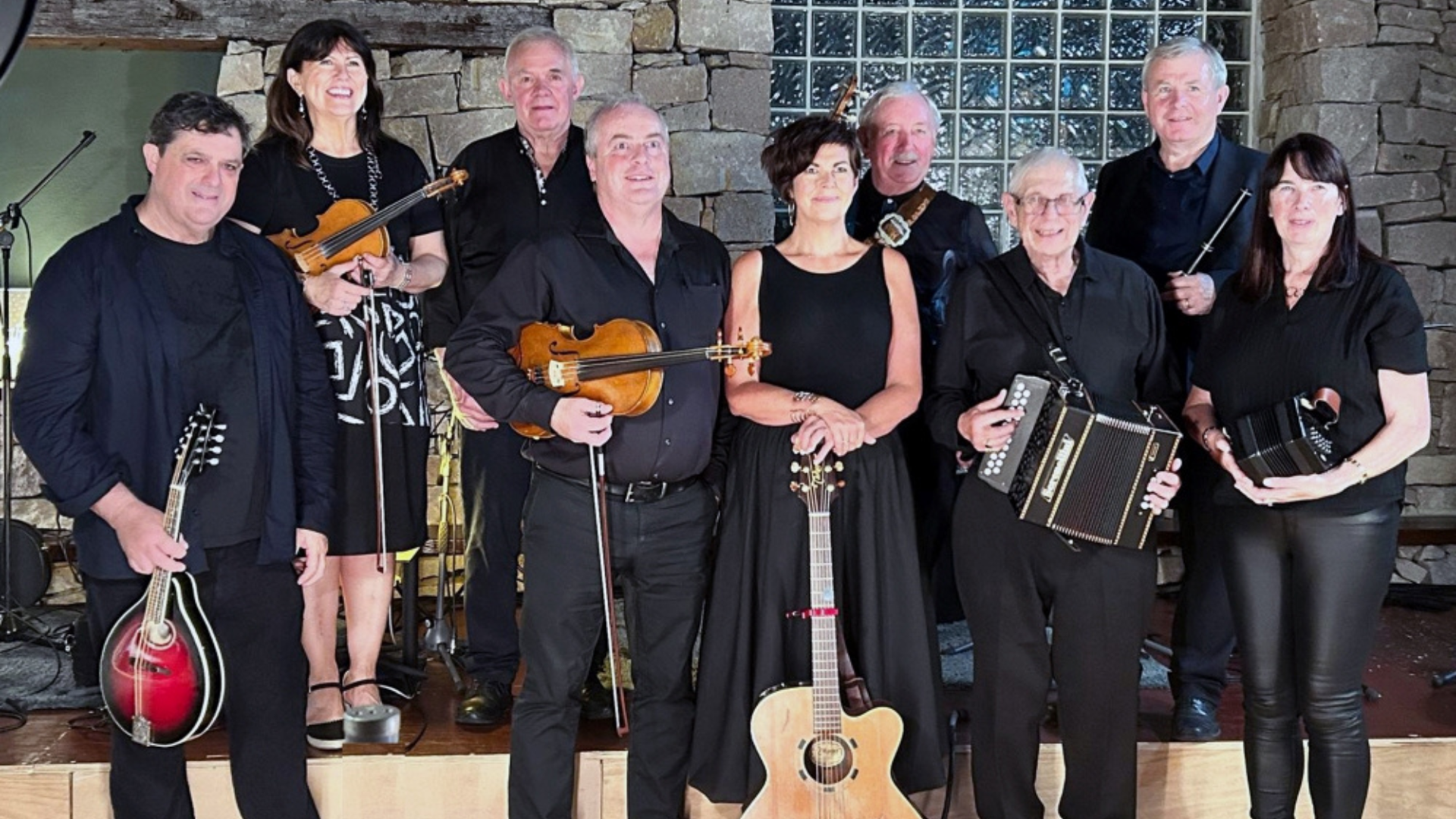
Shaskeen have been a staple of the Irish folk scene for 55 years and counting. They have toured everywhere from the UK to Russia, and at this point in time they have nine members spanning several generations. This week, we sat down with the band leader, Tom Cussen, to discuss their upcoming performance in Triskel Arts Centre, and to tell us a bit about the band’s colourful history from their conception in the 1970s to today.
Is there three words you can give me to describe your music?
Lively, uncomplicated, and exciting.
You got started in Kentish Town in London. What was it like at the time for Irish music culture in the UK?
The word I’ll use is, “fantastic”. I can say that, in hindsight. It’s like when you’re in it, you don’t see it in a sense because you’re part of it, but when you remove yourself from it. It was over fifty years ago since I was in London, great time to be there and the music was absolutely vibrant. From about 1965 to 1975 were probably the peak period of involvement in Irish music. I lived in North London at the time and nearly every second pub was an Irish one. Ballads, trad, sessions and whatever else.
Where would you say is one of the most unique places you’ve played?
The most unique place we played in would’ve been Russia in 1990, in Leningrad. It was a massive culture change; very different. We brought out a group of about forty-five people, of which twenty-two were musicians. You can imagine the craic! The crowds were small, but very enthusiastic. They didn’t get up and dance, but they really appreciated the music. The crowd themselves were primarily musicians at home, and in that respect it was unique because they appreciated what we were doing, but we were appreciative of their own music, and it became a cultural exchange of sorts. Aside from that, for fifteen years we were part of a festival in France, we’ve done every county in Ireland, the UK, Spain, so on.
What county has the best crowds?
That’d be unfair to say! What I will say is, while traditional music is probably more associated to a certain degree with Clare, Galway, and Sligo, in the “pure” sense. Having said that, other counties are just as good; pockets of beautiful music wherever you go. I’m from west Limerick originally, that’s polka and jig country, but I couldn’t play polkas myself as I’ve been away from it too long. I can play a reel, no problem. It depends where you find yourself living, and in that respect every county has young people playing and being involved in the music.
What would you say has been the biggest change, not just to how you perform but how the audience is involved?
When we were traveling in the 1970s, we were playing five nights a week in venues that had singing lounges and stages. We were primarily doing cabaret, but then, we went into the Ceilidh side of things, then we did set dancing for a while, and we’ve now settled into the concert side of it. I’m the only original member, and the longest person here after myself would be Eamonn (Cotter) on concert flute, who has been with us 35 years. Patsy McDonagh has been with us 28 years, and after that they vary as recent as 1-2 years with us. There’s old and young. In the 1970s, we filled a pub in Tuam, Galway every Monday night for three and a half years– you try do that now! You might have a chance in the city, but otherwise, forget about it. 70% of the venues in Galway are nearly gone now. In London, at least 75% of the places we played at are gone too. The dynamics have changed massively, and things are more expensive now.
Is there a particular Irish instrument you feel is culturally synonymous with Irish trad music?
Of course! The Uillean pipes would be number one. I make Cláreen banjos myself with my son, and having said that, the growth of the banjo from the 70s to now is phenomenal. The banjo died off a little in the 50s and 60s, but the folk movement happening in the 70s made the banjo become popular again into the 80s. The two instruments I feel have “mushroomed” in this country in the last thirty years would be banjos and concertinas. A lot of women are picking it up, it’s easy to carry, and once you have it down you realise it’s a phenomenal instrument.
Tell me more about the name of your band, Shaskeen.
First and foremost, it’s the name of a famous song called the Shaskeen Reel. That is where I got it from initially. It means marshy ground, and there’s an area between Clare and Sligo that has a bog called Shaskeen Bog, which I’ve actually got a sod of turf from and have played in. I picked the name in 1970 and we stuck with it. We started off as the Shaskeen quartet, but now there’s nine of us!
Do you have any hobbies outside of your music?
I do, too many. My old profession was electronic engineering and music was my parallel life for a long time. I was lucky to have both, because at the moment you wouldn’t be able to live off the music alone. I’m a collector, and I cycle too.
Cats or dogs?
Dogs!
Tickets are available now for Shaskeen’s performance on Sunday 5 October 8:00PM.

